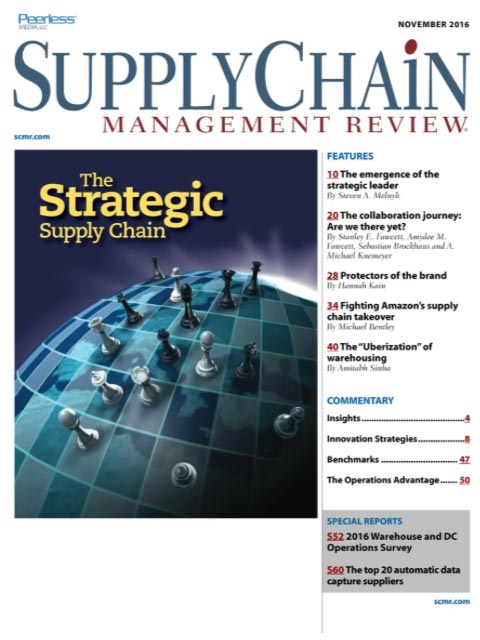Sorry, but your login has failed. Please recheck your login information and resubmit. If your subscription has expired, renew here.
November 2016
Is supply chain management strategic or tactical? Are the best supply chains collaborative? Should the goal be an integrated supply chain or an integrative supply chain? The answers are a mixed bag, according to this month’s contributors. Browse this issue archive.Need Help? Contact customer service 847-559-7581 More options
I am completing my 10th year as the “Insights” columnist. Those of you who have fgloollowed the column during my tenure, or have possibly attended one of my numerous presentations, already know that I am passionate about supply chain management (SCM). I began my career in marketing management where I stayed until I joined Accenture’s logistics and supply chain consulting practice in 1990. Since then, I’ve been lucky to be involved in SCM’s phenomenal evolution—fostered by the growth in global trade and consumerism. SCM is a profession with noble goals, benefiting the world by fulfilling the needs of global citizens, while efficiently using Earth’s precious resources.
When I look back over 10 year’s worth of columns, I see two important trends that need to evolve more quickly. One is the transition from integrated to integrative supply chain management, while the other is supply chains’ emerging role as a defender of the company brand. I believe the two are related to each other. When I look forward, my expectation for the profession is a tall order for managers to fulfill—but it is one that is shared by most of my colleagues.
Integrated versus integrative SCM
Let’s start by looking at integrated versus integrative SCM. Historically, SCM’s major goal has been to ensure that a company balances its supply-side activities to most effectively and efficiently create supply to match customer demand, while meeting corporate objectives such as financial performance targets. Companies have traditionally organized SCM groups around this goal. However, our “noble goals” are broader and more important than just that one. Ultimately, our goals ought to include such things as creating the most competitive supply chain in our vertical—something I have writ¬ten about extensively—and producing the high¬est quality for all products and services sold by our companies. The latter does not just include a physical product’s quality, as purchasing and manufacturing organizations are responsible for that. SCM groups need to organize around fulfilling these additional goals as well.
 |
This complete article is available to subscribers
only. Click on Log In Now at the top of this article for full access. Or, Start your PLUS+ subscription for instant access. |
SC
MR
Sorry, but your login has failed. Please recheck your login information and resubmit. If your subscription has expired, renew here.
November 2016
Is supply chain management strategic or tactical? Are the best supply chains collaborative? Should the goal be an integrated supply chain or an integrative supply chain? The answers are a mixed bag, according to this… Browse this issue archive. Access your online digital edition. Download a PDF file of the November 2016 issue. |
Download Article PDF |
I am completing my 10th year as the “Insights” columnist. Those of you who have followed the column during my tenure, or have possibly attended one of my numerous presentations, already know that I am passionate about supply chain management (SCM). I began my career in marketing management where I stayed until I joined Accenture's logistics and supply chain consulting practice in 1990. Since then, I've been lucky to be involved in SCM's phenomenal evolution—fostered by the growth in global trade and consumerism. SCM is a profession with noble goals, benefiting the world by fulfilling the needs of global citizens, while efficiently using Earth's precious resources.
When I look back over 10 year's worth of columns, I see two important trends that need to evolve more quickly. One is the transition from integrated to integrative supply chain management, while the other is supply chains' emerging role as a defender of the company brand. I believe the two are related to each other. When I look forward, my expectation for the profession is a tall order for managers to fulfill—but it is one that is shared by most of my colleagues.
Integrated versus integrative SCM
Let's start by looking at integrated versus integrative SCM. Historically, SCM's major goal has been to ensure that a company balances its supply-side activities to most effectively and efficiently create supply to match customer demand, while meeting corporate objectives such as financial performance targets. Companies have traditionally organized SCM groups around this goal. However, our “noble goals” are broader and more important than just that one. Ultimately, our goals ought to include such things as creating the most competitive supply chain in our vertical—something I have written about extensively—and producing the highest quality for all products and services sold by our companies. The latter does not just include a physical product's quality, as purchasing and manufacturing organizations are responsible for that. SCM groups need to organize around fulfilling these additional goals as well.
 |
SUBSCRIBERS: Click here to download PDF of the full article. |
SC
MR


Latest Supply Chain News
Latest Podcast

 Explore
Explore
Latest Supply Chain News
- AdventHealth named top healthcare supply chain by Gartner
- Geopolitical readiness in supply chains: Strategic challenges for leaders
- Unlocking retention: The role employee engagement plays
- Can supply chain managers embrace an entrepreneurial mindset?
- Challenges to ESG reporting
- With capacity to spare, logistics real estate demand remains subdued
- More latest news
Latest Resources

Subscribe

Supply Chain Management Review delivers the best industry content.

Editors’ Picks





